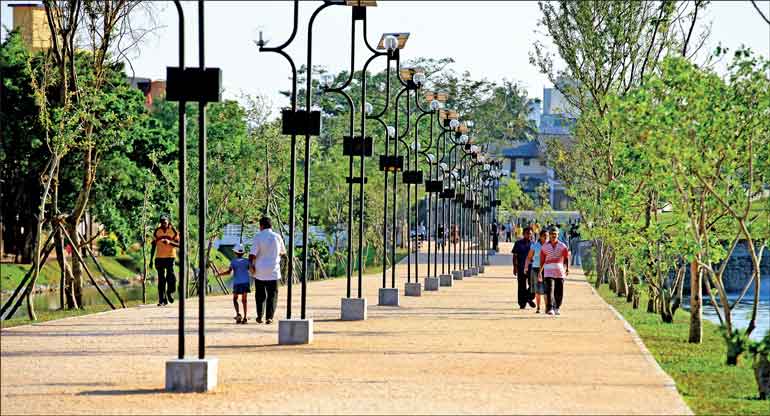Saturday Feb 14, 2026
Saturday Feb 14, 2026
Saturday, 16 September 2023 00:15 - - {{hitsCtrl.values.hits}}
 Even when the intention is to provide the citizens of the city a pleasing open space, the regulations they attempt to enforce there end up only creating anomalies, if not injustices
Even when the intention is to provide the citizens of the city a pleasing open space, the regulations they attempt to enforce there end up only creating anomalies, if not injustices
Today this taxpayer-funded service does not even pretend an independence; thoroughly politicised, it exists only as a handmaid of whoever is in power. The public service attitude is subjective, serving only those whom its master wishes to be served, the rest of the population must accept whatever is dished out to them by the whimsical public servants
 Undoubtedly, a primary, perhaps even the main reason for Sri Lanka’s failure is its public sector; inefficient, inept and corrupt to such an extent that to call it a modern day service provider is a hilarity, a comedy only dulled by the pain and frustration it causes a helpless public. It is everywhere and yet nowhere, our public service will not answer a telephone call leave alone a letter, unless the originator is a Minister!
Undoubtedly, a primary, perhaps even the main reason for Sri Lanka’s failure is its public sector; inefficient, inept and corrupt to such an extent that to call it a modern day service provider is a hilarity, a comedy only dulled by the pain and frustration it causes a helpless public. It is everywhere and yet nowhere, our public service will not answer a telephone call leave alone a letter, unless the originator is a Minister!
Today this taxpayer-funded service does not even pretend an independence; thoroughly politicised, it exists only as a handmaid of whoever is in power. The public service attitude is subjective, serving only those whom its master wishes to be served, the rest of the population must accept whatever is dished out to them by the whimsical public servants.
This tragicomedy has too many aspects to cover in one short article. I will just describe one encounter with the implementation of policy by the public sector at some length, hoping it leads to a greater scrutiny of the inherent buffoonery of this gargantuan anachronism, an institution not only crucially affecting us people on a daily basis, but also absorbing an overwhelming amount of the budget of this poor country.
The episode examined here relates to what I consider a more successful endeavour on the part of the public service, in what may be described as the leisure sector, an area with no comparable competition, hence very little benchmarks. I refer to the several walking paths which were created when Gotabaya Rajapaksa was said to be in charge of the Urban Development Authority (UDA).
No accountable Government could be run in the Rajapaksa manner, yet at least where the walking paths are concerned, the results are there before us. If the approval of the environmental authority was needed, machinery of the works department had to be deployed, the massive manpower of the army used or it was required to cut through the red tape, only a telephone call was needed from the all-powerful member of the Rajapaksa family then. We do not know about the costs incurred in their creation, but the city ended up having beautifully laid walkways, to this day used by thousands.
I am somewhat an intermittent walker, preferring to take turns between several walks – Bellanwila, Parliament area (Kimbulawala?), Nawala, and of course the Independence Square which even offers a small gym. There is no need to emphasise the fact that these amenities require regular attention and maintenance, the focus of which varies with changing administrations. I have always held the view that the users must be encouraged to contribute voluntarily whatever amount they deem fair, perhaps by maintaining a till or some such facility for the purpose. Even a small contribution will give them a sense of ownership as well as a responsibility for the facility. It will be enlightening for the regular users, if the daily costs of maintaining the walkway and its environment is calculated and displayed publicly.
Considering the purpose as well as the nature of recreation, it will be improper however for a State authority to levy a charge on the rate payers using the open area. Besides, there is no standard activity, some walk for an hour, some only a few minutes, some come for the fresh air while some bring their grandchildren to run about.
Now to our main story.
No accountable Government could be run in the Rajapaksa manner, yet at least where the walking paths are concerned, the results are there before us. If the approval of the environmental authority was needed, machinery of the works department had to be deployed, the massive manpower of the army used or it was required to cut through the red tape, only a telephone call was needed from the all-powerful member of the Rajapaksa family then. We do not know about the costs incurred in their creation, but the city ended up having beautifully laid walkways, to this day used by thousands
A few months ago I noticed that the car parks in both ‘Kimbulawala’ as well as at ‘Weli Park’ near Nawala had a gate and a security counter erected. The UDA had decided that there is yet another way of revenue generation – from the vehicles of the walkers. As usual with the Government services there were several attendants hanging around the counter issuing parking tickets. These are both relatively isolated places, what the gates earn cannot amount to much.
Last week I went for a walk at Weli Park Nawala around 10 a.m. As it was unbearably hot, after about 10 minutes I decided to stop. When I was driving out I noticed that the attendant waved through the vehicle in front of me but when it was my turn he demanded Rs. 50. There was no display of the pay scheme for parking, leaving a wide discretion in the attendant. Having a bit of time in my hands I bantered with him, inquiring why the earlier vehicle was not subject to the parking fee.
The middle aged attendant did not look like a walker, out of breath, portly, he was sporting what looked like a Muslim style beard but turned out to be a Sinhalese.
He began by introducing me to the economics of park maintenance, “This park needs a lot of money to maintain it, there are Navy officers cleaning the place,” he explained.
The attendant’s explanation for the free passage of the earlier vehicle was that regular walkers were exempt from parking fees. When I asked him how he defines a regular walker, his interpretation was that one needs to walk every day of the week to qualify, the very athletic type. How does he recognise a regular, I inquired. He was going to give me a Roland for my Oliver.
“We keep a record,” then sensing my misgivings added, “Some people come morning and afternoon. Users happily pay more than the Rs. 50 sometimes.”
Of course he didn’t explain what he does with the extra payment; does he issue more than one parking ticket or just pocket the balance? Any way it was not important. If I understood the carpark attendant correctly, car owners using the facility every day need not pay for parking; in other words, the heaviest user is excused, while the irregular user is made to pay. Six times a week does not qualify, according to the attendant.
Secondly, those who do not come in their cars, there are hundreds of middle class houses around, need not pay anything. If say four people come in a car driven by a regular walker, there is no charge. The occasional walker on a motorcycle will be charged Rs. 50.
These walks are in the suburbs of Colombo, heavy middle-class areas. However, at the Independence Square walk in the middle of the rich Colombo 7 area, there is no charge for parking.
This whole thing only illustrates the essential failure of our public sector mind-set. Even when the intention is to provide the citizens of the city a pleasing open space, the regulations they attempt to enforce there end up only creating anomalies, if not injustices.
One may gloss over it; however, every national indicator shows weakness. This nation is saddled with a public sector whose main concern is self-perpetuation, going through the motions but incapable of meeting the demands of the 21st Century
What could easily be ignored is compounded by clumsy interference, while what should be urgently attended to is ignored. A confounded public are left dissatisfied while public servants issue numerous chits, demand endless form filling and send them on a wild goose chase after “Gramasevakas” and notaries. Despite all this verification, we are mired in a bog of manipulation and deceit.
One may gloss over it; however, every national indicator shows weakness. This nation is saddled with a public sector whose main concern is self-perpetuation, going through the motions but incapable of meeting the demands of the 21st Century.